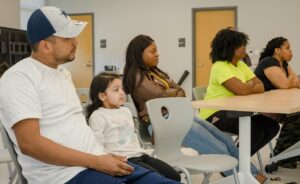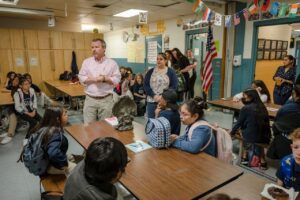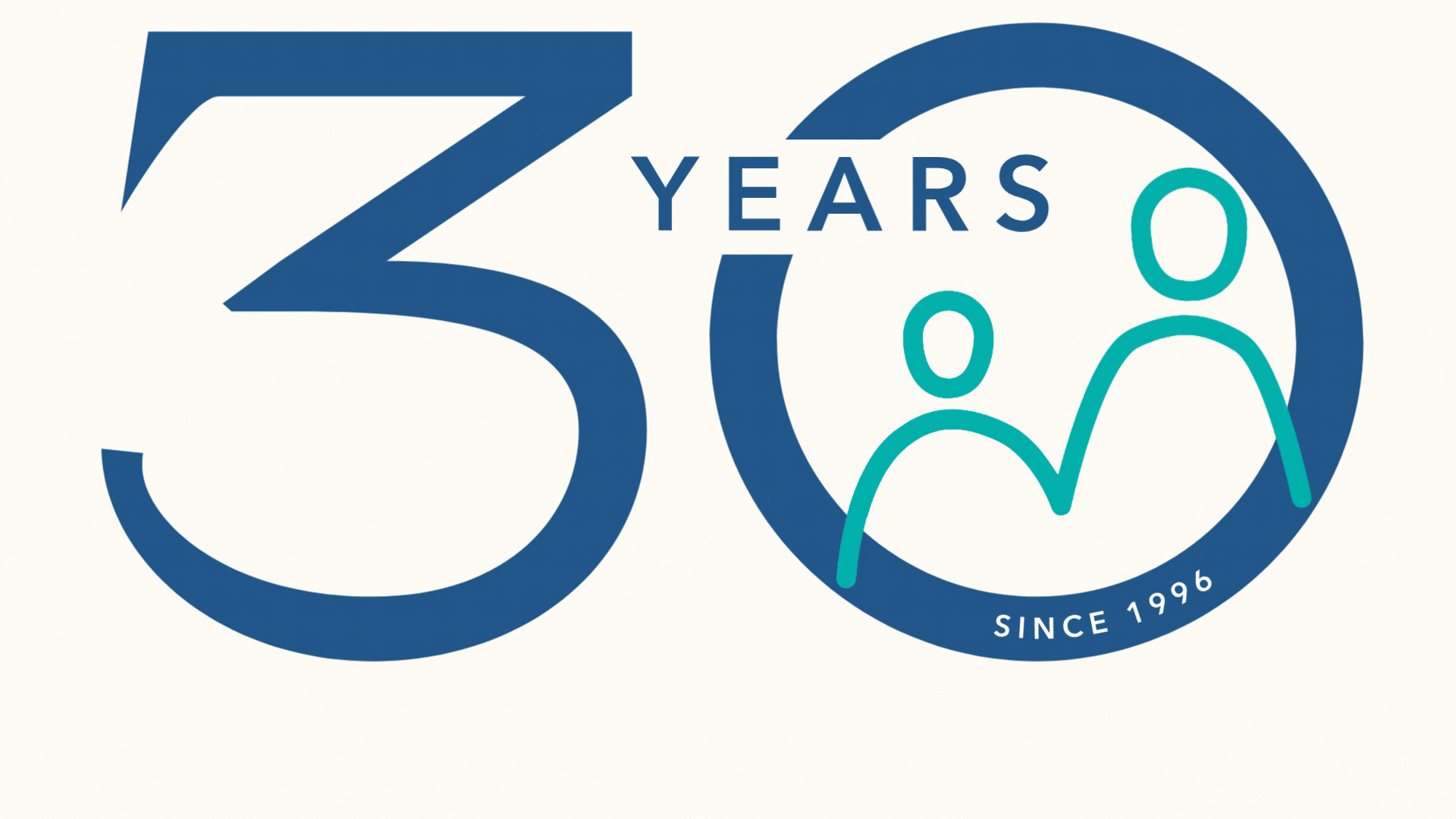For 30 years, the Baltimore Curriculum Project (BCP) has championed the community school mode, an evidence-based approach that transforms public schools into neighborhood hubs offering academic, health, and family support services. Founded in 1996, BCP has partnered with Baltimore City Public Schools, families, and Baltimore’s low-income communities to ensure students thrive not just in the classroom, but in every aspect of life.
One truth continues to guide our work: Strong schools are not built in isolation. They are built with and for the communities they serve. That philosophy is at the heart of the community school model, an approach that recognizes students’ academic success is inseparable from their health, stability, safety, and sense of belonging.
The Community School Model
 The idea of community schools isn’t new. It dates back more than a century, when progressive educators and social reformers saw schools as central to the health and well-being of entire communities. The model has evolved over time, but the core principle remains the same: schools should serve as hubs offering not just education, but wrap-around supports for students and families.
The idea of community schools isn’t new. It dates back more than a century, when progressive educators and social reformers saw schools as central to the health and well-being of entire communities. The model has evolved over time, but the core principle remains the same: schools should serve as hubs offering not just education, but wrap-around supports for students and families.
Decades of research underscore this approach. National studies have shown that community schools improve student attendance, academic outcomes, behavior, and family engagement, especially in historically under-resourced communities. According to the Learning Policy Institute and the Coalition for Community Schools, high-quality community schools are linked to:
- Higher graduation rates
- Improved student mental health
- Better attendance and engagement
- Stronger relationships between schools and families
Nationally, the reported numbers of community schools vary from 5,000 to 8,000 or more. The number of U.S. community schools has risen since 2020, and the educational model is particularly relevant in our post-pandemic educational environment. The pandemic shed light on existing social inequities and the need for wrap-around services for low-income children and families. Educators and policymakers recognize the research that community schools help to improve student outcomes, close post-pandemic learning gaps and address national post-pandemic issues like chronic absenteeism.
The Community School Model in Baltimore
Baltimore City Public Schools, BCP’s educational partner, officially adopted the community school strategy in the early 2000s as a way to address growing disparities in health, housing, and academic outcomes. In 2016, Johns Hopkins University conducted a study on Baltimore’s early implementation of the community school model. Hopkins’ research found that schools using a community school strategy showed gains in attendance and climate, as well as increased access to health services and family support systems.
Statewide, there are more than 620 community schools, which are a key focus of Maryland’s Blueprint for Education, funded in part by Baltimore City and the State of Maryland. City Schools now designates more than 130 schools as official community schools, each staffed with a dedicated Community School Coordinator.
BCP recognized the relevance and impact of the community school model in 1996. We were among the first charter operators in Baltimore to embrace the community school model—not just because it made sense, but because it aligned with what we’ve always believed: Education is community work.
Wolfe Street Academy: A Community School Pioneer
 One of the earliest and most successful examples of the community school model in Baltimore is Wolfe Street Academy, a BCP school since 2005. Wolfe Street officially became a community school in 2006, in partnership with The Fund for Educational Excellence and Latino Providers Network, making it one of the first public schools in Baltimore to adopt the model.
One of the earliest and most successful examples of the community school model in Baltimore is Wolfe Street Academy, a BCP school since 2005. Wolfe Street officially became a community school in 2006, in partnership with The Fund for Educational Excellence and Latino Providers Network, making it one of the first public schools in Baltimore to adopt the model.
Wolfe Street serves a majority immigrant population with high needs around housing, healthcare, and language access. Families weren’t just navigating the school system—they were navigating entire new systems of living.
The community school model gave Wolfe Street a framework to address those layered needs. A full-time Community School Coordinator was placed in the building, tasked with developing partnerships, engaging families, and building systems of support.
That early investment paid off.
 Wolfe Street has since become a national model, cited by the American Federation of Teachers (AFT) for its strong family engagement, student achievement, and long-standing community partnerships. It’s a place where families walk in not just to drop off their children but to attend workshops, access resources, and feel deeply connected to the life of the school.
Wolfe Street has since become a national model, cited by the American Federation of Teachers (AFT) for its strong family engagement, student achievement, and long-standing community partnerships. It’s a place where families walk in not just to drop off their children but to attend workshops, access resources, and feel deeply connected to the life of the school.
Watch a video of the AFT’s visit to Wolfe Street.
Wolfe Street showed BCP, Baltimore, Maryland, and the nation what’s possible when schools lead with care, consistency, and community.
Read about how Wolfe Street collaborates with its community partner, Elev8 Baltimore, to serve its students and families.
The Heart of the Work: Community School Coordinators
Every BCP community school is anchored by a Community School Coordinator—a person who is equal parts connector, advocate, organizer, and problem-solver. Our Community School Coordinators are working every day to:
- Maintain up-to-date resource hubs for food access, housing support, legal aid, and health care.
- Coordinate on-site services and trusted partnerships, bringing support directly into the school building.
- Lead meaningful family engagement efforts—from parent workshops and cultural celebrations to advisory councils that elevate family voice.
- Cultivate a school climate rooted in connection, where students feel seen, safe, and valued.
Their work strengthens attendance, academics, school culture, and family trust.
BCP’s Community School Coordinators are working in tandem with our lead community partner organizations:
- City Springs Elementary/ Middle School: Aaron Trumino in partnership with Elev8 Baltimore
- Frederick Elementary School: Justin Brown in partnership with Bon Secours Community Works
- Govans Elementary School: Jasmine Couch-Murray in partnership with City Schools
- Hampstead Hill Academy: Carrie Mittenthal, Rosalia Castelan in partnership with City Schools
- Pimlico Elementary / Middle School: Theresa Braxton in partnership with Park Heights Renaissance
- Wolfe Street: Heidi Weiss-Beedie in partnership with Elev8 Baltimore
Why It Still Matters
As we celebrate 30 years of BCP, we know that the community school model is more than a program—it’s a commitment. A way of doing school that reflects our deepest values: equity, belonging, and shared responsibility.
This work is about outcomes, yes, but it’s also about people. It’s about trust. It’s about building schools that are not just places to learn, but places where families and students feel welcome, heard, and supported.

